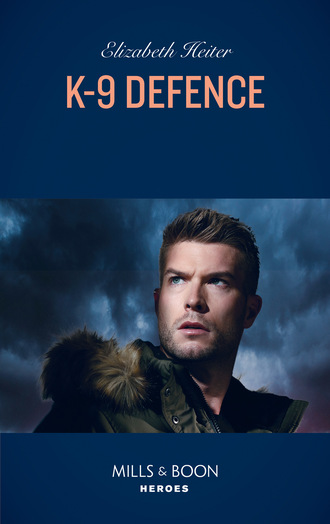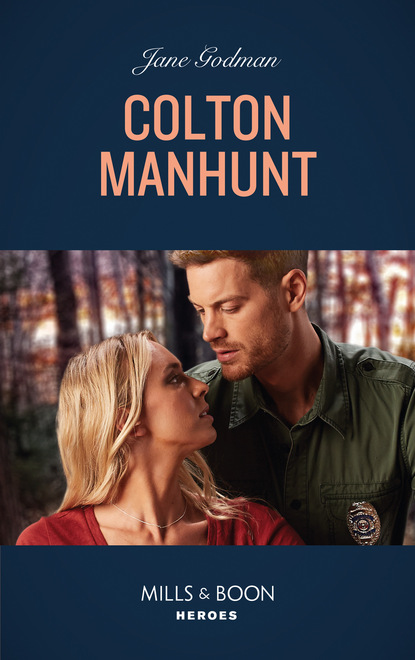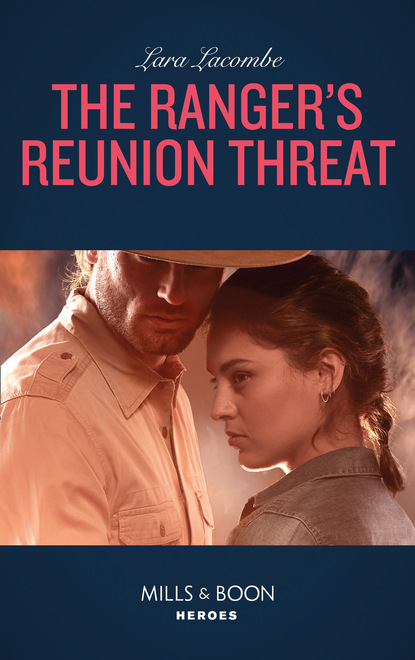
Полная версия
K-9 Defence
She nudged her head between the front seats, resting her chin on his arm as he maneuvered up the winding, unpaved road toward his cabin. It was up high, which made the trek tricky during the worst of winter, but the view was worth it.
Staring out over miles of nothing but snow-topped trees and breathing in the crisp, cold air, so unlike the deserts where he’d served, brought him as close to peace as he figured he’d ever get. And once a military man, always a military man. There was just something about having the high ground that helped him relax.
His closest neighbor was miles away, down in the valley. He rarely saw other vehicles on his ride out of town, and never in the last few miles. A vehicle coming up the final hill meant someone was coming to see him. And no one came to see him.
His parents still called him regularly, certain he had to be lonely. But they’d been afraid of the trip to Desparre, of the wild animals they were certain roamed everywhere and the thick, heavy winters that sometimes prevented travel in or out until spring came around again. They couldn’t understand why he’d come here. But then, they’d never really understood him. Not when he’d joined the military right out of high school and not a decade later when he’d been forced to leave it.
They loved him, but they didn’t realize what he’d been looking for or what he’d lost. Brotherhood. A bond he shared with no one but Rebel these days, because she’d been in the thick of it with him.
As he slowed the truck to a stop in front of his cabin, his breathing evened out. All the open space did that for him. Beside him, Rebel seemed to relax, too.
He opened the driver’s side door, telling Rebel to stay as he hobbled around to the back. Normally she hopped into the front and climbed out after him, but he knew her injury almost as well as he knew his own. She might not be showing it, but she was in pain, too.
“Come on, girl,” he urged, watching as she stepped gingerly to the ground. She led the way up to the cabin, favoring her back left leg.
“We’ll sit by the fire and take it easy tonight,” he promised her, earning a half-hearted tail wag.
As soon as he opened the door, she walked straight over and claimed a spot in front of the fireplace.
“Greedy,” he teased her, and she gave him a look as if to say, Get a move on. It’s cold in here.
He’d had the heat set too low, not expecting the cold to come so soon, although he should have been used to it. By the time he’d moved out here last October, the snow had been so high the real estate agent had needed his help clearing it away so they could even open the door.
He cranked the heat up now, then got to work building a fire. He poured Rebel some dog food and dragged it over to her. He was hungry, too, now that dinnertime was approaching, but his leg was more demanding than his stomach. So, instead of cooking, he settled in his recliner, gingerly lifting his right leg and wishing he’d grabbed some ice for it first. But now that he was settled, he didn’t plan to move for a few hours.
Between the heater kicking on and the fireplace warming the cabin even more, Colter’s stiff muscles slowly started to relax. An hour later, his leg was still throbbing unhappily, but the pain was a lot more manageable.
With the fire roaring away on one side of him, the view of the valley covered in snow through a thick-paned window on the other and Rebel at his side, Colter felt complete. This was why he’d come to Alaska. Yes, his parents’ claim was true—he was hiding here. But he was hiding from all the well-meaning but clueless people—them included—who wanted to fix him. Who had no idea what it meant to survive an ambush when all of his brothers had died.
Rebel whimpered and when Colter glanced at her, he could swear she knew what he was thinking. “It’s okay, girl.”
But instead of calming down, she stood, went to the window and started barking.
Someone was here. And since there was no one in Alaska he knew well enough to visit his house, it wasn’t a guest.
He’d come to Alaska to hide from what was left of his life. Yeah, he could admit that. But there were plenty of other people who saw Alaska as the final frontier: a place to hide away from something they’d done, to run from the law.
Colter winced as he swung his injured leg to the ground, then hobbled over to the cabinet against the far wall and grabbed his pistol. He’d stopped carrying it into town, but right now he was happy he hadn’t given it up altogether.
“Rebel, quiet,” he commanded. In her three years as a Military Working Dog, never once had she disobeyed a command from him.
But today she just barked louder.
Colter released the safety on his pistol and eased toward the door, preparing himself for trouble.
* * *
KENSIE GRIPPED THE steering wheel until her knuckles hurt, stomping her foot on the brake. But it didn’t help. Her rental truck still slid backward, angling toward the edge of the road, toward the drop-off beside the steep hill she was trying to climb.
Why did Colter Hayes have to live in the middle of nowhere?
According to the few locals who would talk to her, he was an ex-Marine hiding from the world after being badly injured. No one seemed to know how he’d been injured or why exactly he wanted to hide. In fact, none of them seemed to know much more about him than the few details he’d shared with her on the street. And yet he’d lived in Desparre for almost a year.
“People come this far into the Alaskan wilderness for three reasons, honey,” the grocery store owner had told her, then ticked off those reasons on gnarled fingers. “Either they love a good adventure, the kind that’s as likely to get them killed as not. Or they want the entire world to leave them the heck alone. Or they’ve done something they don’t want anyone to know about—probably something illegal—and they figure no one will ever track them down here.”
Then she’d narrowed her eyes at Kensie. “We all assume Colter is the middle one. But you’ve got to be careful who you trust.”
Her words echoed in Kensie’s brain as her truck finally stopped its dangerous backward descent. She kept her foot wedged down hard on the brake, her hands locked tight on the wheel, afraid to move. Should she keep pushing forward or turn back?
She leaned forward, craning her head up at the hill in front of her. Snow was still falling on it, obscuring what was little more than a dirt trail. She had one more crest to go and she wasn’t sure if her truck would make it. But she wasn’t sure she could turn it around, either.
Now it was her brother Flynn’s voice she heard in her head. “You’re going to Alaska, Kens? Are you crazy? People venture out into the woods there and never come out again. You could die up there and we’d never even know where to start looking.”
At the time, she’d thought he was overreacting. He always had when it came to her, even now that they were both adults. He’d already lost his little sister and she knew, somewhere deep down that he’d never admit, he was afraid of losing his big sister, too.
She realized now how ill-prepared she’d been for this trip. Desparre was insular. People here already distrusted each other, but they distrusted her double for being an outsider. Some of them had been nice but ultimately dismissive. Others had just eyed her suspiciously and refused to talk. Questioning as many people in town as she could had told her that either no one knew anything about Alanna other than what they’d read in the news, or they just weren’t going to tell her.
But Colter understood this place. And regardless of what he’d said about his tracking skills, she knew one thing. Trackers found people. Whether it was someone who’d set a bomb or someone who’d been kidnapped, she had to believe he could help her.
And she might not be prepared, but she was determined. If Alanna was really here, Kensie wasn’t leaving without her.
Assuming she could get up this mountain.
Gritting her teeth, Kensie switched her foot from the brake to the gas as fast as she could, not wanting to lose traction. The truck’s wheels spun, spraying snow at a crazy angle, and then it shot forward, up the hill.
Kensie grappled to keep control of the wheel, her muscles aching. The truck veered left, then right, but it kept moving upward until she could see the top of the hill. She was going to make it.
As if thinking those words had been bad luck, the truck veered right again, straight off the side of the road. It sank down several feet, jolting her forward as the front end planted itself in a snowbank.
Kensie swore, tears of frustration pricking her eyes. For fourteen years, leads on Alanna had come and gone like rabbits in a magician’s disappearing act. One minute promising and solid and right in front of them. The next minute poof! Like they’d never even existed.
This time might be no different. Her family didn’t think it was. But they’d come to accept years ago what statistics said was a near certainty: Alanna was gone. She was never coming home.
Kensie had never been able to do that. And she didn’t think it was guilt eating at her gut this time, telling her something was here. She had to believe that this time, if she looked hard enough, maybe the magic trick would become real.
Colter could help her. She knew he could. If she could find him. If she could convince him.
Was she even close to where he lived? She had no idea. She assumed she’d followed the directions properly, but what if there’d been a turnoff she’d missed? She could be miles from his cabin.
She peered through the windshield at the snowflakes, falling faster and thicker from the sky. It had been cold when she’d arrived, but temperatures had dropped to near zero in the hours since. And that was down in the main part of town, not up in the mountains where Colter lived.
Fear settled low in her belly as she zipped her coat up to her chin and slid her hood over her head, fastening it tightly. She didn’t need to gun the engine to know there was no way she was getting her truck out of this snowbank.
She was walking from here. She just had to pray Colter’s cabin was nearby and she wouldn’t walk right by it in this snowstorm and then freeze to death.
Chapter Three
The moment she stepped out of the truck, Kensie wondered if she’d made a mistake. Her whole body seemed to ice over as her feet sank into a pile of snow, rising over the tops of her boots. The cold seeped through them, too, soaking her up to midcalf. She had to hold the tops of her boots to make sure they came with her as she climbed out of the snowbank and then her hands were soaked through her gloves.
Enormous snowflakes plopped on her head, sliding down the side of her hood, where some dropped off. The wind sent others flying into her face, where they left a watery trail down her neck and then slipped inside her coat.
She was going to die out here. She could already feel the icy cold in her lungs with every breath. What had she read about extreme cold bursting your lungs?
Calm down, she told herself. Colter’s place had to be close. The grocery store owner had said the top of the final hill. There were no more hills to climb. And yet, no cabin.
There were a lot of trees, though, more than she’d expected this high up. She thought she could see a road marker ahead, leading a winding path through them. Colter’s cabin could be behind the trees somewhere. But so could bears. Or she could get lost and not be able to find her way back to the truck. Every few steps, she glanced backward.
Soon she could no longer see the truck. Panic built inside her and she paused. Keep moving forward or turn back?
Then she heard it. Or maybe hypothermia had already started to set in and she was imagining the barking.
Kensie started to run. Her lungs protested every breath, painful from the cold, but as she rounded another copse of trees, there it was. A beautiful little cabin with a clear, perfect view of the valley below. She could even see a glacier from here. In other circumstances, she would have paused and soaked in the amazing vista.
Tears of relief spilled over and instantly froze on her cheeks and then Colter was there, his strong arm around her shoulders, leading her into his home.
She didn’t even pause at the doorway, wondering if it was really a good idea to trust a man she’d just met. She simply let him help her inside.
As soon as she was through the doorway, Rebel pressed up against her side. The dog stayed with her until Colter pushed her into a big recliner near the fire. Then Rebel sat primly next to her, soft brown eyes full of worry.
The heat from the fireplace made Kensie shiver. It didn’t make any sense, but she couldn’t seem to stop as Colter bent down with a pained grunt. He pulled the sopping wet boots from her feet and propped her legs up near the fireplace. Then he peeled the gloves from her hands, rubbing them between his own big, calloused palms until the warmth finally penetrated.
And so did his words. “What are you doing here? Wandering around in this weather is dangerous. Do you have some kind of death wish?”
Before she could bristle, he let out a heavy sigh and stopped rubbing her hands. “Hold them by the fire. I’ll make you some cocoa.”
“My truck hit a snowbank,” she managed through chattering teeth.
“But why were you up here to begin with?” he asked, looking like he wasn’t sure he wanted to know the answer as he walked into the connecting kitchen.
“I came to see you. I need your help. No one here will talk to me. But you know them. You know the area. You know how to track—”
“I told you, Kensie, Rebel and I don’t do that anymore. And the kind of tracking you’re talking about, we never did. It’s not the same thing. Dogs are trained to do one thing. You can’t just switch them over, make a drug-sniffing dog an explosives one. Doesn’t work like that. And finding people without a direct trail? Even if we had a scent to work from, we wouldn’t be able to do that.”
Kensie felt her shoulders drop. She’d come all this way. This couldn’t be the end of it.
Colter kept talking as he put a pot on the little stove and poured in milk and cocoa. She barely heard his words as she thought about the note that had been found. Thought about Alanna, somewhere in the Alaskan wilderness with her kidnapper.
“...Military Police don’t do that. In a war zone—”
Kensie’s head snapped up. “What did you say?”
“That kind of tracking work,” Colter said, as the scent of cocoa filled Kensie’s nostrils. “We don’t—”
“No, not that. You said you were Military Police?”
“Yeah.” The word was full of wariness.
“So, you know how to run an investigation.”
“So do the civilian police. And they actually have authority here,” Colter said as he handed her a steaming mug of cocoa.
The heat felt wonderful in her hands, the scent tempting her. But she just clutched it and stared up at him. “They don’t want to help me.”
He frowned as he lowered himself stiffly onto the chair on the other side of the fireplace. “Why not?”
Internally, she cursed her stupidity. If he knew the truth about what the FBI thought, he’d call her crazy, too. He’d probably join the chorus of people trying to get her to return home.
She postponed answering him by taking a gulp of the cocoa. It burned its way down her throat, making her eyes water, but it also seemed to warm her from the inside, so she took another sip and then another. When the mug was almost empty, she lowered it to her lap, realizing her teeth had finally stopped chattering.
Pins and needles danced along her feet and hands, but they’d gone numb when she’d been outside. The painful return of sensation was a good thing.
“Kensie,” Colter prompted, staring at her with light blue eyes fringed with pale brown lashes.
He was more than just good-looking. The hard, battle-worn expression he seemed to constantly wear disguised it, but when he stared at her like he was now—with curiosity and sympathy—awareness settled low in her belly.
Suddenly, it wasn’t just the scent of cocoa tempting her.
His dark blond hair was cropped close, military style, but she suspected it would be soft if she ran her hands through it. There was no hint of matching scruff on the hard planes of his jaw, but she wanted to slide her hands over the skin there, too, to pull him close and see how much control he’d have if she kissed him.
As she stared, his pupils dilated. Fire seemed to race over the icy surface of her cheeks and she ducked her head, trying to gain control of her emotions.
It had to be the fear of dying all alone of hypothermia. Or the stress of chasing after Alanna. Or maybe she’d just ignored her own needs for too long.
“It’s old,” Kensie blurted, hoping he hadn’t noticed what she realized had been blatant ogling. But of course he had, or she wouldn’t have seen the reciprocal attraction.
“What’s old?”
She wanted to smile at the confusion in his voice, a little part of her hoping he was still as distracted as she was. The more sensible side of her brain reminded her that she was stranded in his cabin and she barely knew the man.
The voice of reason in her mind won. She straightened in her seat, meeting his gaze with an all-business stare. “The case is fourteen years cold.” She shrugged, hoping he’d believe it, because it was the truth. It just wasn’t the whole truth.
She rubbed Rebel’s chin with her free hand, to distract herself from the lie by omission. She prayed he wouldn’t read it on her face.
“So, they’re not going to help you?” He sounded incredulous and a little outraged.
The combination just made her like him more. But she couldn’t afford to be distracted by him. Not when Alanna might be out there somewhere. Not when everything inside of her was screaming that he could be the break she’d been waiting for most of her life.
And she had him. She could feel it. He sympathized with her pain and he had skills she’d never possess. With his help, they might really be able to bring Alanna home.
“It’s a resources thing.” She paraphrased what she’d been told hundreds of times over the years. Police always had to work on new cases, missing persons who hadn’t been gone for years, who had a higher chance of rescue. The longer someone was missing, the less chance they had of ever being found.
Years ago, they’d first learned the realities about Alanna coming home as months went by with less and less interest from the police and the community. Her parents had made a promise. They’d do whatever it took to be sure that wasn’t Alanna’s fate.
But fourteen years of disappointment and two other children who needed them had taken its toll. Kensie knew it was her turn to take up the torch and keep that promise.
She stared expectantly at Colter, sensing his next words would be a wary agreement to try and help.
But he just shook his head sadly. “Believe me, I understand your pain, Kensie. Probably better than you realize. But I’m no good for you. I’m no good for anyone. I can’t help you.”
* * *
MAYBE SHE WAS CRAZY.
It wasn’t just her parents and Flynn who’d begged her not to fly out to Alaska on a questionable piece of evidence and a thin thread of hope. It was also her friends, the ones who’d been by her side since childhood, who’d watched how the constant surge of hope followed by inevitable, bitter disappointment had almost torn them all apart.
She’d overheard family friends talking about how Flynn’s car accident had been a necessary wake-up call for her parents, reminding them they still had two children who needed them. And in some ways, it had. But it had also been the day they’d decided to accept something Kensie never would: that Alanna was gone for good.
But right now, hopelessness reared up.
After his announcement that he wouldn’t help her, Colter had gone outside to dig out her truck over her objections. The whole time he’d been gone, she was worried he’d hurt his leg or freeze out there. But he’d bundled up in much better winter gear than she owned and forty-five minutes later, he’d reappeared.
She could tell he was trying to hide how badly his leg hurt, so she’d forced herself to keep quiet rather than asking. But guilt had followed her closely as Colter drove behind her rental all the way back into town. She’d parked by the police station where she’d first seen him playing fetch with Rebel, rolled down her window and debated what to say. She’d known him only a few hours and yet she’d been struggling to say goodbye.
Apparently, he had no such quandary. He’d given her a wave, a solemn “Good luck,” and off he and Rebel had gone.
She’d probably never see them again.
The idea left a bad taste in her mouth.
But right now, she had to figure out how to move forward. She’d come here alone, with no expectation of help from an ex-Marine with investigative and tracking experience. Nothing had changed. She could still do this alone.
As many times as she told herself that, she still felt Colter’s absence like a huge blow to her goal of finding Alanna. And maybe a little bit of a personal blow, too, although she didn’t know him well enough to feel anything more than unsatisfied lust.
“Get over it,” Kensie muttered. If Colter wouldn’t help her, she’d do it herself.
After her experience slamming into that snowbank up near Colter’s cabin, her first stop should have been to get better winter gear. But down in the main part of town, the snow was slowing and the accumulation was much less. Only an inch or two of slushy white coated the streets.
More than a pair of warm boots, Kensie needed a mental boost. Something had to go right, something to reassure her that she wasn’t chasing a ghost. Maybe there would be a lead at the store where the note had been found. If she could locate the store itself.
Having an immediate goal made Kensie feel better. She steeled herself as she stepped out of her rental and back into the cold, but couldn’t stop the shiver that raced up her spine. As quickly as possible, she stomped back into the grocery store where the woman had helped her before.
The instant Kensie walked inside, the woman—who was probably the owner as well as the cashier—looked up. Her steel-gray eyes, the same shade as her long braid, were sharp and knowing. “He was no help?”
Kensie shrugged in response, not wanting to badmouth Colter after he’d whipped her up a pot of cocoa, warmed her hands between his own and dug her truck out of the snow despite a badly injured leg. “It was a silly idea,” she said instead.
The woman let out a grunt that sounded like she disagreed. “What else do you need?”
A small smile tugged at Kensie’s lips. Living in a place like this must teach you to read people. As the bell dinged behind her, announcing another customer, Kensie said, “Colter Hayes has his own troubles. But I still need to find the store where the note was found. Do you think you could draw me a map? The roads are really confusing out here.”
“That’s because our roads are what you city folk would call hiking trails. Honey, you might want to wait until the snow clears. It’s out on the edge of town—so far out, most people don’t even think of it as part of Desparre. Owned by a cranky old guy who’s as likely to close for the day as not if the mood strikes.”
Ignoring the little voice in her head reminding her what had happened when she insisted on driving to Colter’s place in this weather, Kensie shook her head. “I want to try today. I need some good news right now.”
“He might not have any.”
“I know,” Kensie said over the lump that had risen in her throat. She swallowed the discomfort back. She had to stay positive.
If she didn’t keep searching for her sister, who would?
“All right,” the woman agreed with a deep frown that told Kensie she didn’t approve. But she drew a map and explained it three times.










